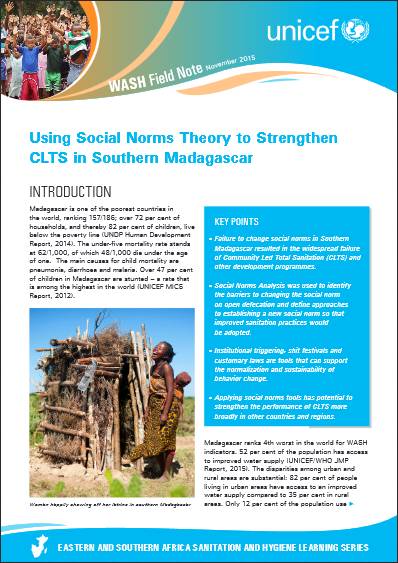Using Social Norms Theory to Strengthen CLTS in Southern Madagascar
 |
position paper , experience Nov 2015 ; 8 pages
Ed. UNICEF - Antananarivo UNICEF - New York
Downloadable format: PdF
Downloadable from the publisher
Abstract:
This Field Note focuses on the southern region of Madagascar and documents how the region is transitioning from a 100% open defecation to a 100% ODF (Open Defecation Free) region. The southern region is one of the poorest regions in the country and characterized by restrictive, traditional beliefs as well as a rigid hierarchy of power and influence, which contribute towards the failure of development projects in this region.
This note reviews the innovative approach used to address ODF efficiency and sustainability in the fragile programmatic context of Madagascar by using the social norms theory as both a lens and a tool by which to analyze and improve the performance of the CLTS programme.
This note provides insights into how Social Norms Theory may have broader relevance and applicability to CLTS programming, performance and sustainability beyond Madagascar.
Target Audiences:
Facilitator / Educator , Cooperation actors , Local and national decision makers
Keywords: |
access to sanitation (CI) (DT) (ET) (ope) , CLTS Community-led Total Sanitation (CI) (DT) (ET) (ope) , hygiene (CI) (DT) (ET) (ope) , rites and cultures (CI) (DT) (ET) (ope) , socio-economic analysis (CI) (DT) (ET) (ope) |
Country: |
Publishers/Broadcasters: |
|
UNICEF
-
Fonds des Nations Unies pour l'Enfance - Antananarivo - Madagascar |
UNICEF - New York - Usa |
If there is a broken link, we will be pleased to receive a message: communication@pseau.org